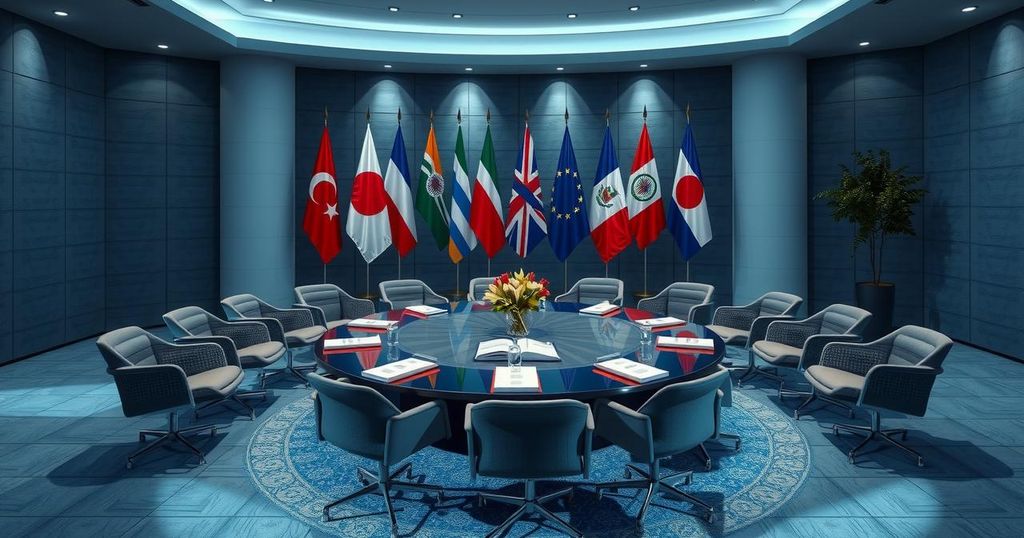Trump Allies Claim Israeli Agents and Warmongers Undermining Iran Talks

Allies of former President Trump are claiming that “Mossad agents” and certain “warmongers” are trying to sabotage U.S.-Iran negotiations. This controversy follows the dismissal of Pentagon officials, perceived as threats to an anti-war approach. The ongoing talks are juxtaposed against a backdrop of rising skepticism toward Israel, shown by shifting public opinion among young Republicans. Trump maintains optimism about reaching a deal without military action.
In a striking development, allies of former President Donald Trump are accusing agents of the Israeli intelligence agency, Mossad, and certain “warmongers” of attempting to undermine ongoing negotiations with Iran. These claims are not filtered through the typical state-run media in Tehran, but rather emerge from Trump’s inner circle and their media supporters.
Recent discussions on conservative talk shows have highlighted tensions within the Trump administration regarding foreign policy, particularly concerning Iran. Tucker Carlson recently featured Dan Caldwell, a former Department of Defense official, who was reportedly removed from his position for allegedly leaking sensitive information. Carlson critiqued the establishment, suggesting Caldwell’s dismissal was politically motivated due to his non-mainstream views on foreign policy.
On another front, former Fox News anchor Clayton Morris alleged on his podcast that pro-Israel factions are actively working to dismantle what he termed the “anti-war team” at the Pentagon, which has been largely assembled by Trump. Morris pointed to former Israeli Mossad agents, claiming they are utilizing social media efforts to mischaracterize figures like Secretary of Defense Pete Hegseth, though he did not specify who these agents were.
The Trump administration appears to be split between conventional Republicans and the more isolationist “America First” faction. This group, which includes chief of staff Susie Wiles and director of national intelligence Tulsi Gabbard, has been vocal in their opposition to pro-Israel ideologies that they feel have dominated GOP foreign policy.
The recent firings, including Caldwell’s, seem to invigorate isolationist figures, marking a noticeable shift within the Republican Party from its historically hawkish stance. Notably, pro-Trump commentators have criticized Merav Ceren, who was nominated for a position focused on Iran and Israel at the National Security Council. Morris implied Ceren’s Israeli background compromises her role, raising eyebrows over the dual citizenship issue.
This rhetoric reflects a larger trend in shifting American attitudes towards Israel, particularly after the recent attacks led by Hamas, which bolstered skepticism among some U.S. citizens. A Pew poll from April indicates that unfavourable views on Israel rose to 53 percent, particularly among younger Republicans who gravitate towards media platforms like Morris’s podcast and Carlson’s show.
As Trump attempts to balance strong foreign policy ambitions with a promise to avoid starting new conflicts in the Middle East, contradictions have emerged within his team. For instance, Trump’s envoy, Steve Witkoff, initially suggested that the U.S. might tolerate limited uranium enrichment by Iran but later walked back his statements amidst criticism. Likewise, Secretary Rubio’s comments signal a potential reopening of discussions surrounding Iran’s nuclear capabilities.
American and Iranian officials convened in Oman over the weekend for what marks the third round of negotiations, amidst reports from Trump that talks are progressing positively. Trump optimistically remarked that a new agreement could be reached without resorting to military intervention, stating, “A deal is going to be made there.”
The recent actions and rhetoric from Trump’s allies reflect a significant shift within the Republican Party regarding its approach to foreign policy, particularly concerning Israel and Iran. With growing skepticism about Israeli influence and a call for non-interventionist strategies, the divide between traditional hawks and isolationists continues to be exacerbated. While Trump touts progress in negotiations with Iran, contradictions among his senior envoys highlight the complexities of achieving a cohesive policy. Ultimately, the ongoing discussions will be pivotal in shaping U.S. relations with both Tehran and Jerusalem, as pressures mount from various factions within the party and public opinion continues to evolve.
Original Source: www.middleeasteye.net







